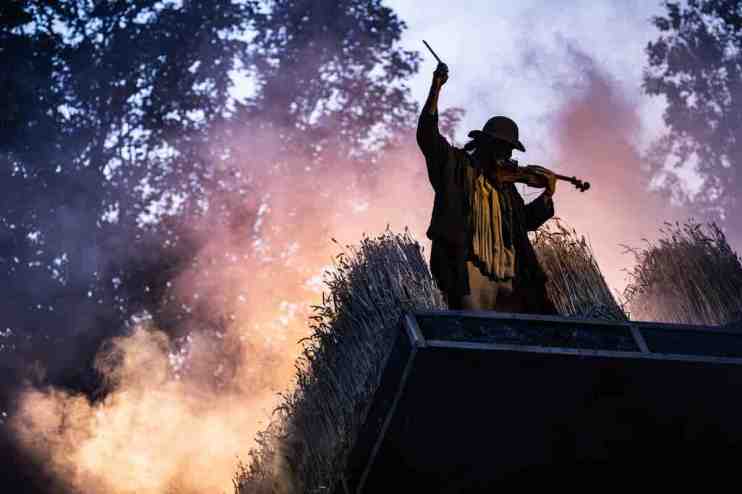Fiddler On The Roof at Regent’s Park Open Air Theatre review

When is a musical not “just a musical”? How do you review a piece of theatre like Fiddler On the Roof which currents affairs have turned into a lightning rod? Do you avoid the show for fear of offending either side? Or dissect the dancing but ignore the elephant in the room?
Fiddler on the Roof is a story about the precarious lives of the Jewish communities confined at the start of the twentieth century in the “Pale of Settlement“, a western region of the Russian Empire that included areas of present-day Poland, Lithuania, Moldovia, Ukraine and Belarus. Life could go on, side by side with locals, cordially and respectfully, but it could also include random harassment and pogroms: forcible displacement of entire villages. It’s also about how individuals forge their own identity and pick their own journey, forever balancing the pull of tradition of an entire people with that of modernity and individual choice. Some productions emphasise the former theme, others the latter.
This production, by director Jordan Fein, is nowhere as slick and entertaining as its 2019 predecessor, by Trevor Nunn. Nunn chose to daze and astonish with spectacularly acrobatic dance sequences: the Cossacks at the tavern and the bottle dance at the wedding of Tevye’s first-born Tzeitl were hugely memorable. Fein opts for realism so that all the dancing here takes on a drunken, slightly chaotic quality even if all the bottles manage to stay upright enough.
In 2019 Andy Nyman cast Tevye as a put-upon anti-hero, overwhelmed by the women in his household and by a confounding future, yet joyously optimistic, self-mocking and resourceful. Nyman had great on-stage chemistry with all the other actors, especially his wife Golda. Nunn’s production was a truly choral affair. Adam Dannheisser’s Tevye, by contrast, is physically and emotionally assertive and commanding, he braces for an unfair hand and, far from doling out self-aware irony, he draws strength from tradition.
This 2024 Tevye is a different proposition. It almost feels like a different story, partly because the chemistry with the rest of the cast is not there, especially with Lara Pulver’s Golda. This makes the rejection scenes with the young pretenders of his daughters feel unduly harsh and the duet “Do you love me?” transactional and devoid of real affection.
The invectives against the Tzar, the enunciation of the words pogrom, Ukraine and Kiev are all so pronounced that they feel almost like textual interpolations. They are not: they’ve always been there, we just had not noticed them before. Fein and Dannheisser make sure we do and therein lies the crux of this production.
It plays an edgy and rather disingenuous game by injecting hints and allusions of contemporary political relevance, such as its (now widely accepted as correct) pronounciation of Kiev the Ukrainian rather than Russian way, but without committing to a position on current affairs. If we fail to notice its vague hints towards modern geopolitics, we become shallow. If we make a big deal of them, there is always the fall-back argument that a musical is just a musical and we are over-interpreting.
But on this occasion a musical is not just a musical. This Fiddler on the Roof opened as the Israeli-Hamas conflict entered its tenth month of renewed hostilities, following Hamas’ murder of over 1,200 Israeli citizens and Israel’s retaliatory destruction of homes and infrastructure in Gaza, killing over 40,000. Opening night was followed by the International Criminal Court’s application for the arrest warrants of Israeli Prime Minister Benjamin Netanyahu and Hamas’s leader in Gaza, Yahya Sinwar, for war crimes. The international community, long supportive of a two state solution for the region, meanwhile, is mostly paralysed. How can one hope to ignore the glaring parallels?
The answer is: you can’t. The cognitive dissonance evoked by the show is impossible to drown out. This is a shame, because it is hard to argue with the sheer brilliance of the material, its themes as relevant – perhaps eve moreso – as they ever were, and staged in one of London’s most spectacular theatrical venues. Perhaps you should just find out for yourself.